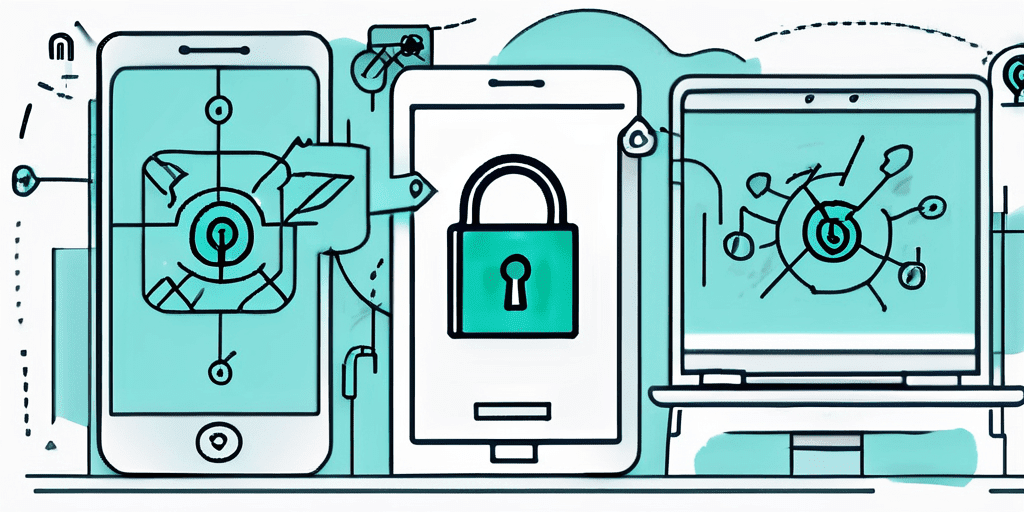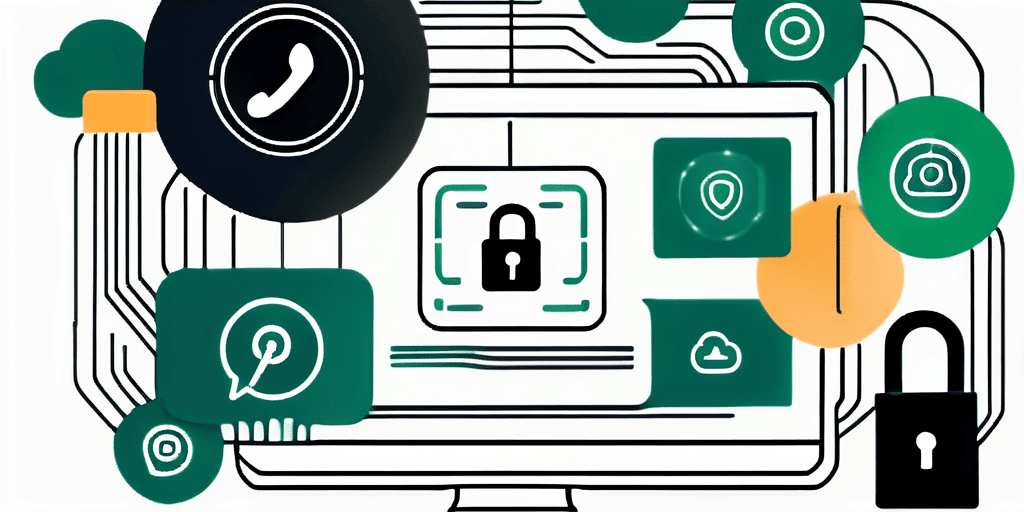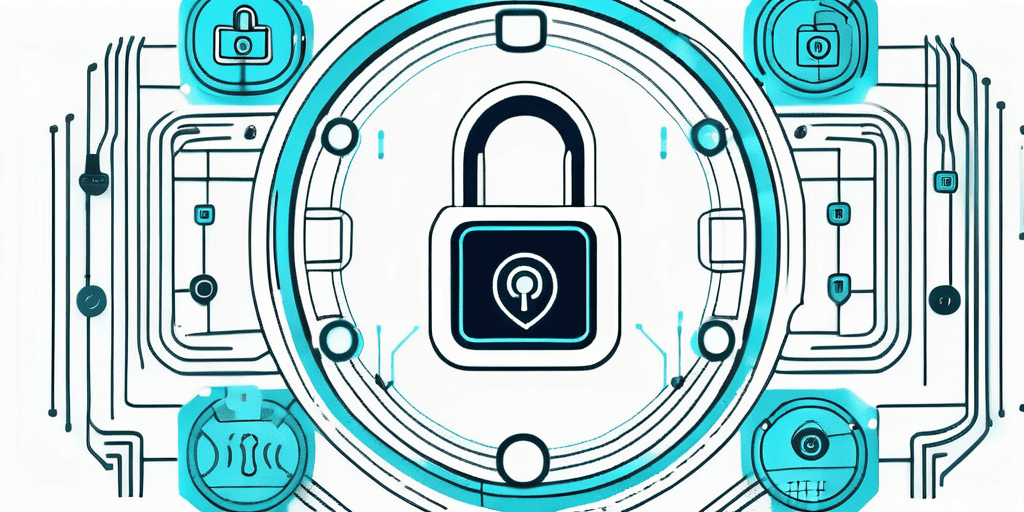Understanding WhatsApp’s Security Infrastructure
Regarding secure messaging, WhatsApp has implemented various measures to ensure user privacy. One of the primary elements in its security infrastructure is end-to-end encryption. End-to-end encryption is a security feature that encrypts messages sent between users, making them visible only to the sender and receiver. This encryption ensures that even if a third party intercepts the communication, they cannot read its contents. Notably, this security measure has been endorsed by tech giants, including WhatsApp’s parent company, Facebook. To further protect user accounts, WhatsApp offers two-step verification. This feature allows users to enter a PIN code when registering their phone number on a new device. This additional layer of security prevents unauthorized access and strengthens the overall security of the account. Financial institutions, healthcare organizations, and government agencies are examples of companies that have benefitted from WhatsApp’s security infrastructure. These entities often rely on secure messaging services like WhatsApp to transmit sensitive and confidential information. Financial institutions, in particular, have found great value in WhatsApp’s security features. With the rise of digital banking and mobile payments, secure communication channels have become paramount. Banks can now securely communicate with their customers, providing real-time updates on transactions, account balances, and even personalized financial advice. This level of security instills confidence in customers, knowing that their sensitive financial information is protected. Healthcare organizations, too, have embraced WhatsApp’s security infrastructure to safeguard patient data. In an era where electronic health records are prevalent, the secure transmission of medical information is crucial. Doctors can now securely share patient diagnoses, treatment plans, and test results with colleagues and specialists, ensuring that critical information is not compromised. This level of privacy and security is essential in maintaining patient confidentiality and complying with strict healthcare regulations. Government agencies have also recognized the importance of secure messaging platforms like WhatsApp. Whether it’s intelligence agencies sharing classified information or government officials discussing sensitive matters, the need for encrypted communication is undeniable. By leveraging WhatsApp’s security infrastructure, government entities can ensure that their communications remain confidential, protecting national security interests and maintaining the trust of their citizens.Identifying Common WhatsApp Security Threats
While WhatsApp has implemented robust security measures, it is not immune to security threats. Hackers and cybercriminals are continually devising new methods to exploit vulnerabilities. As technology advances, so do the tactics used by cybercriminals to infiltrate WhatsApp’s security defenses. One prevalent threat that users face is phishing attacks. These attacks involve fraudsters posing as trusted contacts or service providers, luring unsuspecting users into disclosing sensitive information. The art of deception is their weapon, as they cleverly mimic the appearance and tone of legitimate messages. The consequences can be dire once the user falls into their trap and reveals their login credentials or personal details. Identity theft and financial fraud are potential outcomes that can wreak havoc on an individual’s life. Financial institutions like banks have become prime targets for WhatsApp phishing attacks. In 2020, several Brazilian banks reported a surge in phishing attempts through WhatsApp. Fraudsters disguised themselves as bank representatives, exploiting users’ trust in their financial institutions. They sent messages requesting user information under the guise of security measures, leading to significant financial losses for both individuals and institutions.Malware and Spyware Risks
While phishing attacks are a common threat, WhatsApp users must also be wary of malware and spyware. These malicious software programs can be disguised as innocent-looking files or links sent via messages. Once a user clicks on these seemingly harmless elements, the malware or spyware is surreptitiously downloaded onto their device. This grants hackers unauthorized access to personal data and enables them to monitor device activities without detection. The consequences of falling victim to malware or spyware can be devastating. Real-life examples abound, illustrating how these threats can compromise users’ privacy. In 2019, the notorious Pegasus spyware, developed by the Israeli company NSO Group, targeted WhatsApp users. This sophisticated spyware exploited a vulnerability in WhatsApp’s voice call feature, allowing hackers to install the spyware on the recipient’s device without their knowledge. Once installed, the Pegasus spyware gained full control over the device, compromising the users’ privacy and security on an unprecedented scale. WhatsApp users must remain vigilant and educated about these security threats. By staying informed and adopting best practices, such as verifying the authenticity of messages and refraining from clicking on suspicious links or files, users can mitigate the risks associated with phishing attacks, malware, and spyware. WhatsApp continues to enhance its security measures, but it is a collective effort between the platform and its users to ensure a safe and secure messaging experience.The Impact of WhatsApp Security Breaches
When WhatsApp’s security is breached, the impact can be far-reaching and have severe consequences for individuals and businesses.
Personal Data at Risk
When security breaches occur, users’ personal data is susceptible to being stolen, leading to potential identity theft, financial fraud, and privacy invasion. This includes sensitive information such as names, addresses, phone numbers, and even private conversations. A high-profile example is the Cambridge Analytica scandal, where the personal data of millions of Facebook users was collected without their consent. Although WhatsApp, as a subsidiary of Facebook, was not directly involved in this scandal, it highlighted the need for robust security measures to protect user data across all platforms. The impact of personal data breaches extends beyond immediate financial losses. Victims often experience emotional distress, loss of trust in online platforms, and the arduous task of recovering their compromised identities. The aftermath of such breaches can be a long and challenging journey for individuals, as they navigate the complex process of reclaiming their privacy and rebuilding their lives.Threats to Business Communication
Businesses rely on secure communication platforms to protect sensitive information, intellectual property, and trade secrets. When WhatsApp security is compromised, these essential elements are at risk. For instance, in 2021, global cybersecurity firm Check Point reported a vulnerability in WhatsApp that could potentially lead to data leakage and manipulation. The vulnerability, “WhatsApp VoIP stack Remote Code Execution (RCE),” allowed hackers to execute arbitrary code on targeted devices, potentially giving them access to sensitive business communications. Imagine the detrimental consequences if a competitor gains unauthorized access to a company’s confidential strategies, financial records, or customer data. The implications could be disastrous, resulting in financial losses, reputational damage, and even legal ramifications. The fallout from a security breach can extend beyond immediate financial implications. Businesses may face a loss of customer trust, decreased market share, and the need to invest significant resources in rebuilding their security infrastructure. The impact on their bottom line can substantially affect their financial stability and long-term viability in an increasingly digital and interconnected world.Mitigating WhatsApp Security Vulnerabilities
To mitigate WhatsApp security vulnerabilities, users and the platform must adopt proactive measures. Regular software updates are of utmost importance when it comes to ensuring the security of your WhatsApp account. WhatsApp understands the ever-evolving nature of security threats and, as a result, regularly releases software updates to address vulnerabilities and improve overall performance. These updates enhance the user experience and provide crucial security patches. Therefore, it is essential for users to promptly update their app to the latest version to benefit from these security enhancements.
Safe usage practices are equally vital in maintaining WhatsApp security. While the platform takes measures to protect its users, users themselves must exercise caution when interacting with unknown contacts. It is important to be vigilant and refrain from clicking on suspicious links, as they may lead to phishing attempts or malware installation. Additionally, users should be cautious when sharing sensitive information and ensure they are confident about the recipient’s identity.
Enabling two-step verification provides an added layer of protection against unauthorized access to user accounts. This feature requires users to set a unique and memorable PIN code, which is an additional barrier for potential hackers. It is crucial to choose a PIN code that is not easily guessable and to remember it, as forgetting the PIN can lead to potential account lockout.
By following these proactive measures, users can significantly reduce the risk of falling victim to WhatsApp security vulnerabilities. Remember, your security is in your hands, and taking these steps will help you enjoy a safer and more secure messaging experience.
Regular software updates are of utmost importance when it comes to ensuring the security of your WhatsApp account. WhatsApp understands the ever-evolving nature of security threats and, as a result, regularly releases software updates to address vulnerabilities and improve overall performance. These updates enhance the user experience and provide crucial security patches. Therefore, it is essential for users to promptly update their app to the latest version to benefit from these security enhancements.
Safe usage practices are equally vital in maintaining WhatsApp security. While the platform takes measures to protect its users, users themselves must exercise caution when interacting with unknown contacts. It is important to be vigilant and refrain from clicking on suspicious links, as they may lead to phishing attempts or malware installation. Additionally, users should be cautious when sharing sensitive information and ensure they are confident about the recipient’s identity.
Enabling two-step verification provides an added layer of protection against unauthorized access to user accounts. This feature requires users to set a unique and memorable PIN code, which is an additional barrier for potential hackers. It is crucial to choose a PIN code that is not easily guessable and to remember it, as forgetting the PIN can lead to potential account lockout.
By following these proactive measures, users can significantly reduce the risk of falling victim to WhatsApp security vulnerabilities. Remember, your security is in your hands, and taking these steps will help you enjoy a safer and more secure messaging experience.
Future of WhatsApp Security
As technology advances, so does the need for enhanced security measures. WhatsApp recognizes the importance of staying ahead of emerging threats and invests in future security features. WhatsApp understands the necessity of providing users with increased protection against security vulnerabilities. To address this, the development team is working on a range of upcoming security features that will further fortify the platform.
WhatsApp understands the necessity of providing users with increased protection against security vulnerabilities. To address this, the development team is working on a range of upcoming security features that will further fortify the platform.
Upcoming Security Features
One of the highly anticipated features is multi-device support. This groundbreaking addition will allow users to connect multiple devices to a single WhatsApp account without compromising security. Whether it’s a smartphone, tablet, or computer, users will have the flexibility to seamlessly switch between devices while maintaining the highest level of security. WhatsApp is harnessing artificial intelligence (AI) to enhance security measures. By leveraging AI algorithms, the platform can detect and prevent suspicious activities, such as unusual login attempts or messages containing malicious content. This proactive approach will provide an additional layer of defense, ensuring that users can communicate with peace of mind. By implementing these upcoming security features, WhatsApp aims to not only bolster user confidence but also solidify its position as a secure and reliable communication platform for millions of users across the globe. However, while WhatsApp has made significant strides in bolstering its security infrastructure, no system is impervious to vulnerabilities. Users must understand the security measures in place, identify common threats, and adopt safe usage practices to mitigate risks and safeguard their personal and business communications. WhatsApp recognizes the ever-present need to stay one step ahead of these threats. By investing in developing advanced security features, WhatsApp is committed to providing a secure messaging platform that users can rely on.Conclusion
Tthe future of WhatsApp security holds great promise. With the introduction of multi-device support and the integration of AI algorithms, users can look forward to an even more secure and seamless messaging experience. As technology advances, WhatsApp will continue to adapt and evolve its security measures, ensuring that users can communicate confidently and securely.As you navigate the complexities of WhatsApp’s security and the broader digital threat landscape, remember that proactive measures and expert guidance are key to safeguarding your business communications. Blue Goat Cyber, a Veteran-Owned enterprise, specializes in comprehensive B2B cybersecurity services tailored to your needs, including medical device cybersecurity, penetration testing, and compliance with HIPAA, FDA, SOC 2, and PCI standards. Protect your business from cyber threats with our dedicated support. Contact us today for cybersecurity help and partner with a team passionate about securing your digital assets.
WhatsApp Cybersecurity FAQs
WhatsApp uses end-to-end encryption to secure messages, calls, and media shared between users. This means that the messages are encrypted on the sender's device and can only be decrypted by the recipient's device, making it nearly impossible for anyone else, including WhatsApp itself, to read the content of the messages.
Due to its end-to-end encryption, it's extremely difficult for messages to be intercepted and read by third parties. However, if a device is compromised by malware or if a user has enabled backups to cloud services, there is a potential risk for messages to be accessed by unauthorized parties. WhatsApp's end-to-end encryption does not protect cloud backups.
WhatsApp's privacy policy outlines how it handles user data. The app collects some user data, such as account information, messages (temporarily, in encrypted form, for the purpose of transmission), and connection information. With the introduction of the General Data Protection Regulation (GDPR) in Europe and other privacy laws, users have rights over their data, including access and deletion rights.
While WhatsApp's end-to-end encryption secures messages from being read, using any app on public Wi-Fi can pose risks if the network is compromised. Attackers could potentially capture other unencrypted data sent over the network. Using a virtual private network (VPN) when accessing sensitive applications over public Wi-Fi is advisable.
Users can enhance their WhatsApp security by enabling two-step verification in their settings. This adds an additional layer of security by requiring a PIN when registering their phone numbers with WhatsApp again. Users should also be cautious of phishing attempts and scam messages, regularly update the app to the latest version, and avoid sharing sensitive information without verifying the recipient's identity.
Like many large platforms, WhatsApp has been targeted by attackers. Notable incidents include a vulnerability that allowed hackers to install spyware on a user's phone by calling them through WhatsApp. The company quickly addressed the issue once it was discovered. Users are encouraged to update the app for the latest security patches and protections.


